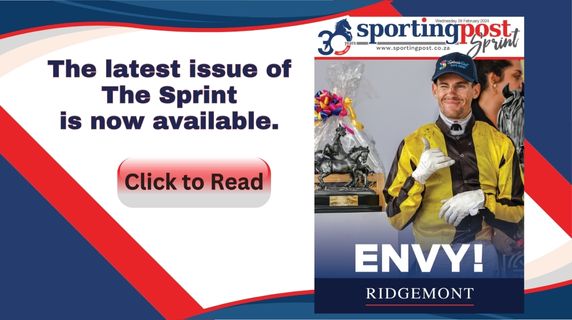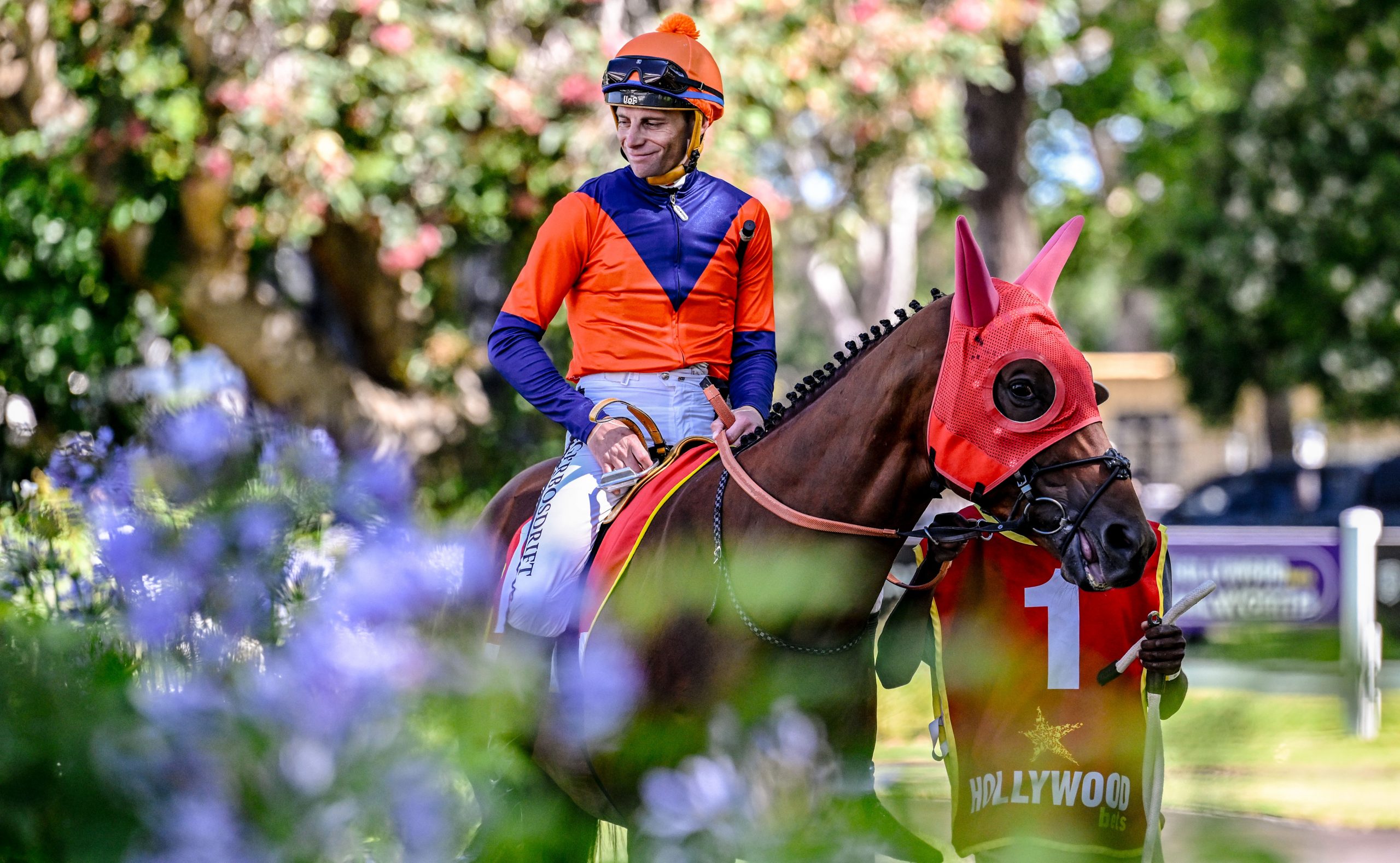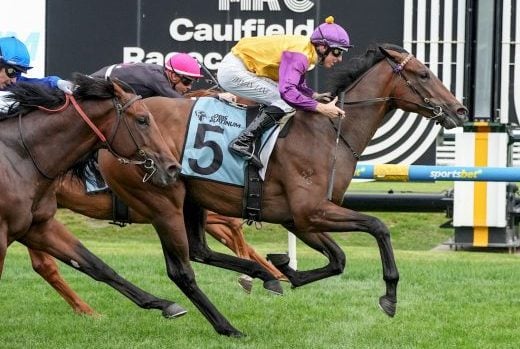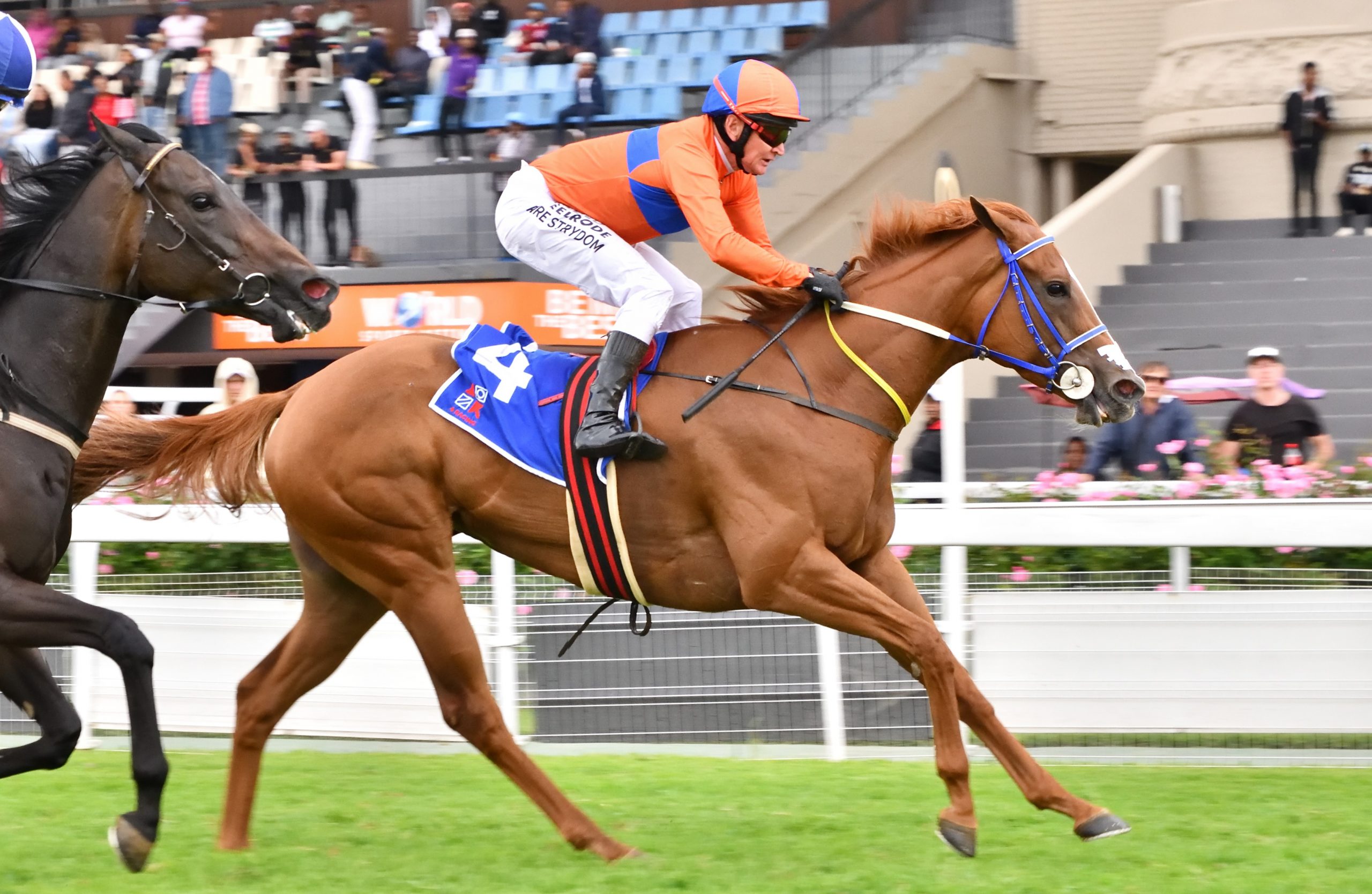It’s been a week since Rachel Venniker (22) flashed past the post to win Saudi Arabia’s US$400,000 (R7,63m) Invest Saudi International Jockeys Challenge Stakes last Friday. In the process, she created a number of historic firsts, writes Robin Bruss.
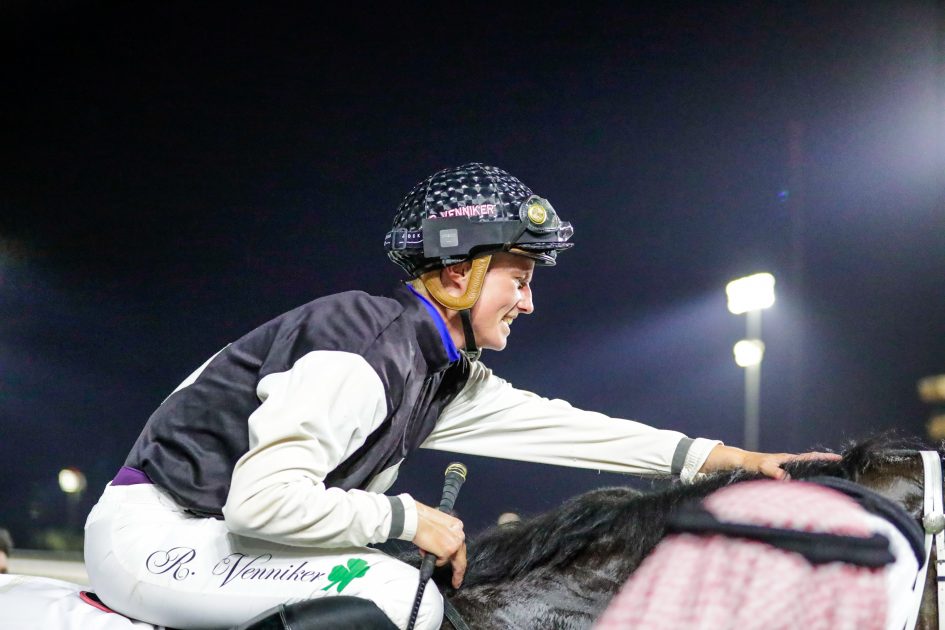
South Africa’s only female jockey shines in Saudi’s International Jockeys thriller (Pic – Liesl King)
Rachel became the first South African female rider to win in the desert Kingdom of Saudi Arabia, the first South African female to defeat male rivals of the calibre of the world’s no.1 jockey Ryan Moore (whose mount ran 3rd) and former Australian legend Damien Oliver (5th).
It was her first trip out of South Africa to any country and her first big race win as a fully-fledged jockey, having only completed her apprenticeship a month ago.
And the value of the race was more than the purses of the WSB Met and the Hollywoodbets July combined.
Emerson’s famous quote “Do not go where the path may lead, go instead where there is no path and leave a trail” came to mind as I watched the elated Rachel being led in aboard the British bred Cliffs of Fury with Saudi owner Refaei Sanat Alghuraban and trainer Nawaf Fawaz.
It was Cliff’s of Fury’s first win in 10 starts in the current season, and the realisation dawned that the horse had run the race of his life in the hands of a young jockette who had equally ridden the race of her life 6,200 km from home, to defeat 6 other woman and 7 of the world’s best male jockeys in the final round of the 4 part challenge in the world’s richest racing weekend.
It makes me think: Why do some riders excel whilst others don’t?
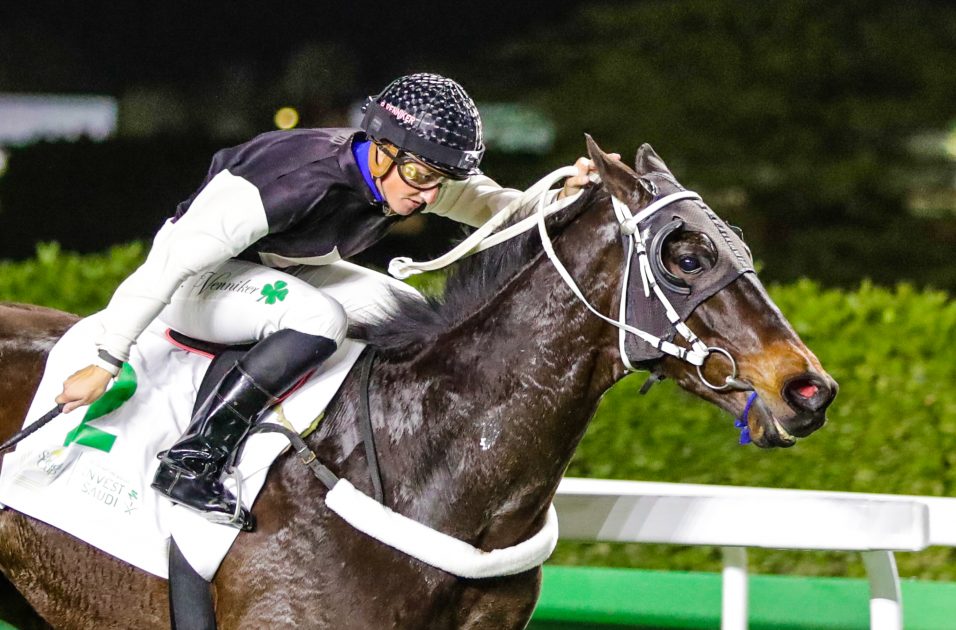
Determination personified! (Pic – Liesl King)
What is it that makes the difference in jockeyship between winning and losing? Is it strength to drive the horse home?
Is it balance to maintain speed and momentum in the rush to the line?
Is it sheer determination and extreme fitness to outstay, outmatch and outgun all of the others?
Or is it more a planned strategy or even tactical enterprise to outfox the rest?
Perhaps a combination of all of these.
“It’s in her hands” says 5 times former champion SA trainer, Geoff Woodruff, now training in Saudi Arabia for the Sheik Almousa stable and who gave Rachel her first ride at the races in Riyadh in Round 1 of the four-part competition.
“Horses instinctively run for her”, he says “she has the natural balance of a good horsewoman and I think they try harder for her”.
The winning ride on Cliffs of Fury posed some challenges for Rachel. The parade ring instructions were given in Arabic and were told to her by a translator, at the end of which he asked, “do you understand?” And she said “no”.
So far so good. Be confident, ride your own race.
Previously in Round 2, Rachel had drawn one of the fancied horses. A difficult customer in the stalls, he was fitted with a blindfold to load, but as the gates flashed open, the blindfold was caught up in the bridle and the horse jumped out almost a furlong behind the others.
A disappointment can be daunting, ask any professional athlete, one misfortune or circumstance can be dent confidence, so mental toughness and resilience are important.
“I get knocked down, but I get up again, you never gonna keep me down” Tubthumping’s famous sportsman’s song plays through the head!
“My mentor, Michael Roberts, always told me to put the knocks behind me, pick up my head, smile and carry on” says Rachel. And she always has.
“Geoff Woodruff had stressed to me the importance of breaking well from the gate on the turf track which is on the inside of the dirt course, quite narrow, and to get well positioned and overcome Cliffs of Fury wide gate 10 of 14 runners”
“I got out fast, steadily moved across to be 3rd, then 2nd as we swung for home, then went for the horse early to take the lead.”
The tactical break away gave her a 3-length advantage and then came to drive to the line and the determination of rider and horse to hold the lead. The challengers were coming.
“I could hear them behind me” says Rachel, “I could hear the crowds shouting as we ran past the stands. I used my crop and got him home just in time”.
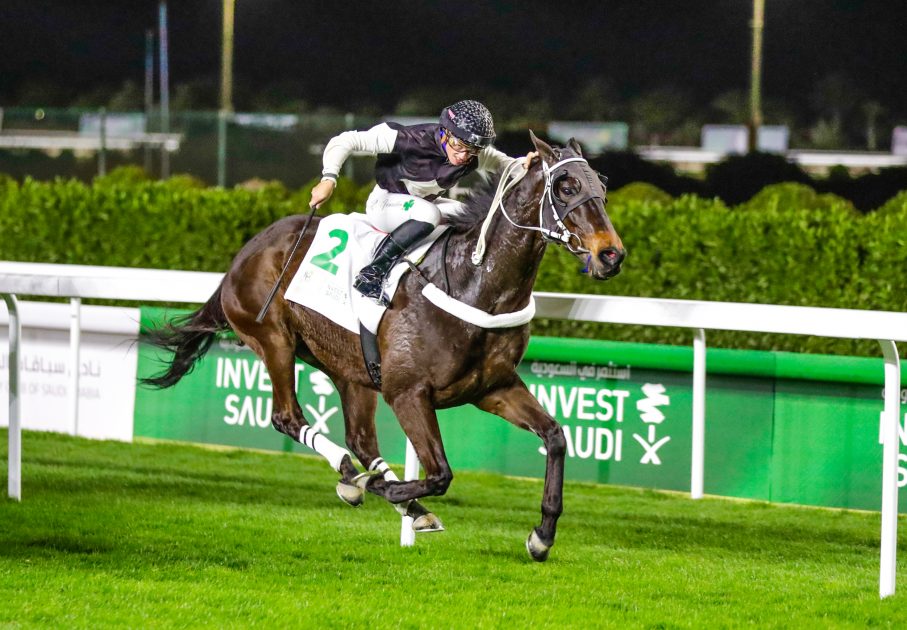
Where the race was won, the tactical breakaway, a diminishing lead to hold on by a head. (Pic – Liesl King)
Jubilation in winning on the world’s stage had to be tempered after the prize giving when Rachel was called before the Chief Stewards of the Saudi Jockey Club.
In South Africa, the rule is that a jockey cannot use the crop more than 12 times, in Saudi it is eight.
Together they counted the number of smacks in the replay. It was 12.
“We find you guilty of breaking the local rule, you will be stood down for 8 days and pay a fine of 60% of your earnings.”
“I get knocked down, but I get up again, you never gonna keep me down…”
Cest la Vie. It was an error, it was acknowledged and penalised.
The rules of the game. But the race that might have been lost – and it was won. The South Africans roar: We WON!
“I loved Saudi Arabia” says Rachel “My Mum Marian travelled with me as I had never been out of the country before.”
“When the invitation arranged by the International Racing Bureau arrived from the Saudi Jockey Club, it included two First Class Tickets, and complementary 5-star accommodation. Everything was extremely well organized, and we were very grateful for the warmth and hospitality we received”
Marian Venniker, always a huge supporter of Rachel’s career and who started her riding from the age of four, said that being in Riyadh for the Saudi Cup weekend and the International Jockeys day felt like being on a movie set.
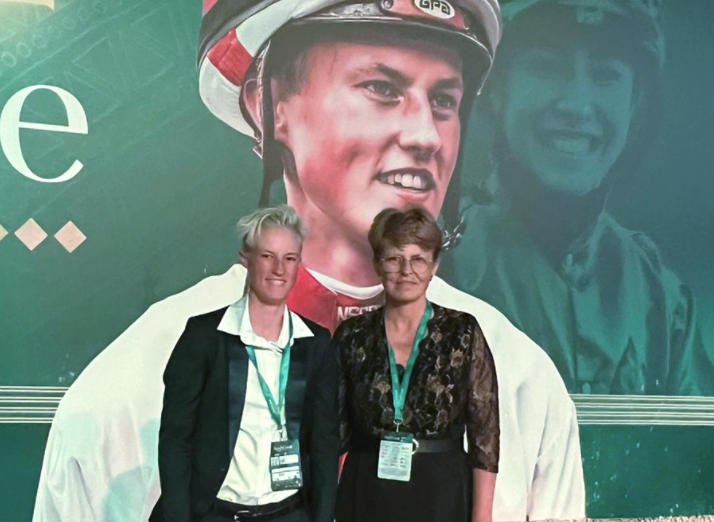
Rachel and her Mum Marian on the “movie set” of the world’s richest raceday. (Pic – Supplied)
The jockeys were accorded celebrity status and commentators spoke warmly and enthusiastically about their careers and achievements so that racegoers would become acquainted and supportive as fans will do in any sport because it provides context and builds involvement and excitement.
“Getting to know other jockeys from around the world was also wonderful and to share hear their stories and enjoy some experiences in the desert and the city was a big thrill”.
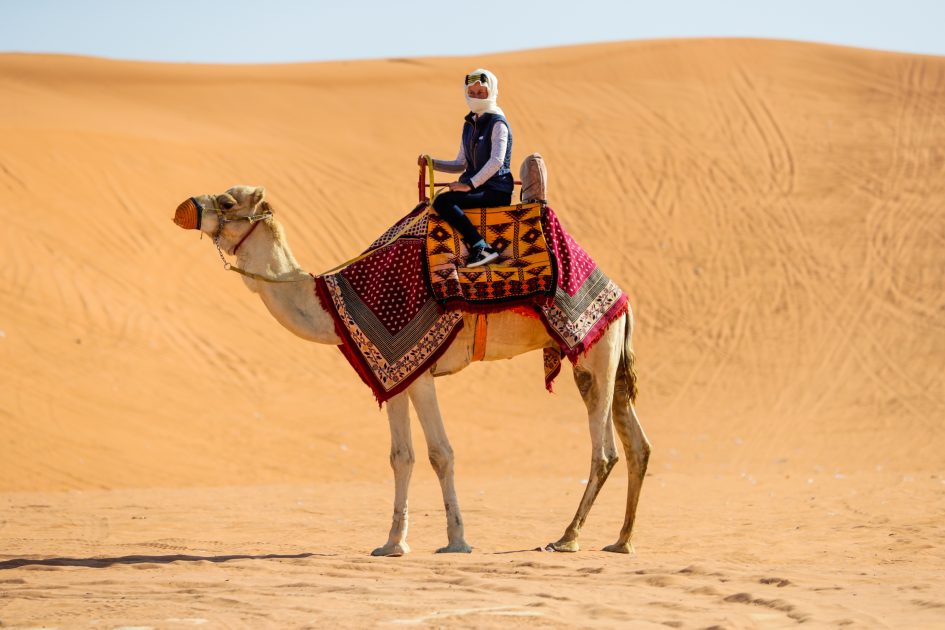
Rachel’s ride on this beast in the desert was a lot higher and a lot slower. (Pic – Liesl King)
“It was an experience of a lifetime” said Marian, “and we were both proud and grateful that we could repay the kindness with a win which justified the invitation”
Such magnanimity is an important trait of the Venniker family. Marian and her husband Brett are both attorneys, but both horse mad.
Brett’s Mom Wendy Venniker is honoured in memoriam by the Wendy Venniker show jumping arena at the Shongweni Club.
Rachel’s determination and love of the horse mirror her grandma. The love of the game from one generation to the next, and so a horsewoman’s life it was destined to be.
The win in Riyadh last Friday could be a breakthrough which could lead to future international invitations.
The International Racing Bureau’s Adrian Beaumont has advised that the Saudi win means that Rachel’s name has been put forward for consideration to England’s Shergar Cup international jockey meeting at Ascot racecourse in August.
“Rachel finished in 4th place of the 14 riders in the overall points standings in Saudi” he added “and did South Africa proud. She has a good shot of a future invitations abroad.”
It was also interesting to hear from South Africa’s now famed international racing photographer Liesl King that there was talk in Riyadh all week about the strides being taken by female jockeys around the world.
“Damien Oliver told me that in Australia, the jockeys’ applications are now 80% female and 20% male” she says. “And there is also an international jockeys’ event in Japan, mostly male in the past, but England’s Hollie Doyle rode last year.”
Enjoy the recap:
Rachel’s own pathway to her achievement at the ripe old age of 22, has been by no means easy.
“I grew up as a horsewoman and started riding work at Summerveld as a teenager as we live only 8 minutes from Summerveld. I am naturally light and can ride at 52 kg” said Rachel.
“I loved it and very soon it became an obsession and I realized that I wanted to become a jockey”
The first application was made to the SA Jockeys Academy in 2018 at age 16 and Rachel’s application was rejected.
At a second application, she was failed on account of not meeting the threshold level for a fitness test and was told that it would be better to finish her Matric than become a jockey.
However, she continued to ride work as well as continue to complete her Matric at school as well as continually improved her strength and fitness.
The Three Wise Men
In October 2020, a delegation of three trainers arrived at a Management meeting at the Academy at Summerveld. All three has been champion Jockeys and all three had been graduates of the Academy.
Michael ‘Muis’ Roberts had been the Academy’s most successful graduate ever. Champion Jockey as an apprentice, he was 11 times Champion title holder before going to try overseas, became stable rider to Sheik Mohammed of Dubai, and won the British Jockeys Championship, the only South Africa ever to do so.
Garth Puller had become Champion Jockey of South Africa.
Kevin Wright had been Champion Jockey of Zimbabwe.
The three arrived with one purpose: to propose that Rachel be permitted to enter the Academy.
“She has the talent, the drive and the ambition to make the grade” said Muis.
“She is hardest worker I know” said Garth, “and I have no doubt she can be successful”
“Rachel is the best female rider I’ve seen” said Kevin.
When three champions of their craft take the trouble to endorse character and capability of what they have seen, then the criteria of recommended values from a text book fly out of the window.
“There are precedents” they went on, “Lyle Hewitson did not come from a full apprenticeship in the normal way, he came from a work riders programme with special dispensation. Similarly Aldo Domeyer joined late. Why not Rachel?”
There were some reservations expressed. Rachel would be the only girl, and therefore would have to stay alone in separate quarters from the boys, there might be problems, she might be singled out, it would be harder….
But ultimately a decision had to be made. The three wise men prevailed. The decision was to APPROVE the application, with a 6 months’ probation period and 5 year apprenticeship.
On 5 January 2021, Rachel arrived at the SA Jockeys Academy to start. And it was hard to be the only girl staying alone in a separate wing and to take derision from the boys and from others in racing.
To be the only girl, naturally lighter and with less strength than boys meant working longer and harder in all aspects as well as in the gym and the need to constantly prove herself. But such adversity also made her tougher and her character stronger.
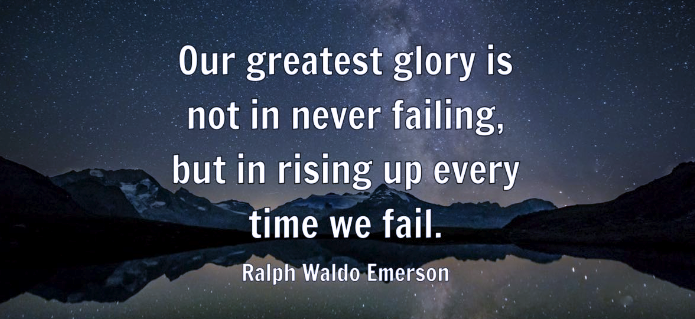
In year two, Rachel was allowed to live at home, only a few minutes away and with family to support her goals, including three sisters, she has never looked back.
“Incoming Headmaster Marius Nel was very supportive of me” says Rachel, “and I began to love my time in the Academy, which has nurtured every champion jockey in South Africa since 1958.”
In her first 6 months, Rachel had 36 qualifying rides and won 4 races, placing her 15th of the 25 apprentices in the Academy.
In season 2021/22, her first full year of riding, she won 70 races to rocket to the top as Champion Apprentice and she has remained on top ever since, with 107 winners in 2022/23.
She completed all the qualify landmarks in near record time and it was realized that her apprenticeship could be completed in 3 years instead of five.
In January 2024, she graduated from the Academy to become a full-time professional jockey.
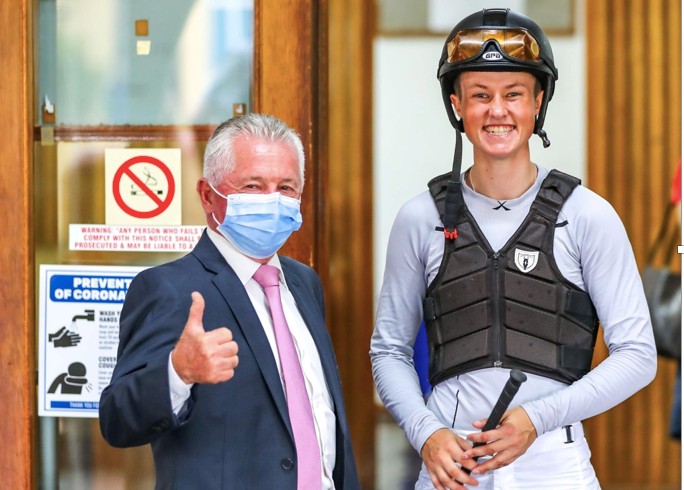
Michael Roberts with the young apprentice Rachel in 2021 (Pic – Candiese Lenferna)
“I give thanks to my mentor, Mr Roberts” says Rachel who has a deep and admirable respect for the man who has guided and helped her.
“He has helped me with every aspect of jockeyship, from technique and style, race riding and tactics, character and behaviour in my approach to be a professional athlete. He reminds me to be respectful and grounded and not let anything go to my head. It is a job and a responsibility to carry the hopes and dreams of owners and trainers, fans and punters, and I understand it is a high-risk sport with danger and risk of injury. I am so grateful to be living my dream and give thanks for the opportunity.”
“I also thank my sponsor, Nic Jonsson of Jonsson Workwear, who has always been a grand supporter and gave me my first opportunity to ride in races and my first winner.”
It is Nic’s late father Benji Jonsson, who was the long time Chairman of the SA Jockeys Academy and its greatest benefactor and supporter.
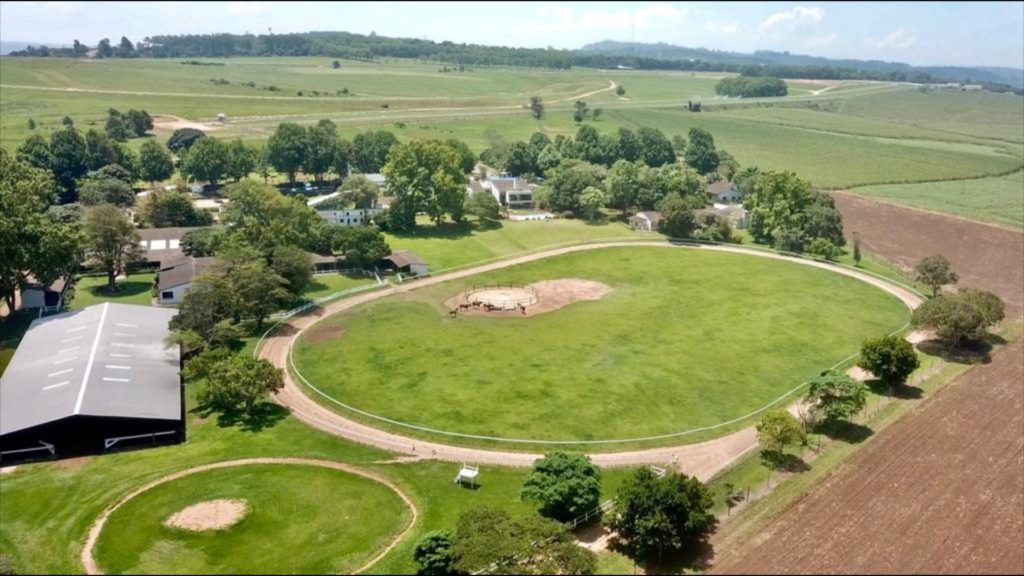
The SA Jockeys Academy
The SA Jockeys Academy itself is a venerated institution with a proud and honourable history since it was inaugurated in 1958.
It is unique in its construct, multi-disciplinary holistic approach, and depth of training. It is not merely a race riding school, it is an Academy that also embraces education, personal self-realization and professionalism and aims to instill values so necessary in a jockey: courage, dedication, fitness, honesty and integrity.
The three Clubs, Durban, Clairwood and City Sporting Club put up the initial capital plus a £30,000 grant from the Province of Natal.
Previously, apprentices were indentured to individual trainers and it was something of a world first when the Academy began at Marianhill in 1961.
Proud Record of the SA Jockeys Academy
The Academy has trained professional jockeys for 63 years producing no less than 29 Champion Jockeys in countries outside of South Africa, including Great Britain, Mauritius (10), Hong Kong (4 jockeys, 24 champion titles) as well as ALL of the Champions inside SA and Zimbabwe.
For the past 27 years it has been open to all races, and in fact 80% of apprentices today are non-white, and it is the most transformed organization in horse racing.
For all its proud record, SAJA has its own challenges of funding and support, much of it caused by the now defunct Phumelela failing to honour its commitments.
Like many institutions in our great sport, some reconstruction is required.
But that’s another story for another day.
For now, they can bask in the limelight of Saudi success and the potential that Saudi, which has nothing like it for the training of their own apprentices, could do well to consider how they might work together in the future.
And Rachel’s desert adventure may open other doors to other women and not just her own.


